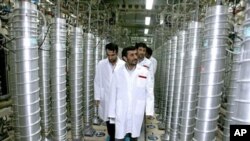The United States Tuesday said an Iranian offer to trade its low-enriched uranium for more highly-processed fuel for a research reactor is unacceptable. The State Department said U.S. diplomats are aggressively pursuing the idea of additional sanctions against Tehran because of its non-cooperation on the nuclear issue.
The Iranian offer, in a letter to the International Atomic Energy Agency (IAEA), was described as Tehran's first official reply to an IAEA confidence-building proposal offered last October.
But the State Department says the Iranian message does not contain anything that hasn't been heard before, and that Tehran continues to back-track from its initial acceptance of the IAEA plan.
Under the proposal offered in October with big-power backing, Iran would have shipped most of its growing stockpile of low-enriched uranium abroad in return for the provision, several months later, of more highly-enriched fuel for a Tehran reactor producing nuclear isotopes for medical purposes.
In its message to the IAEA, Iran said Tuesday it is willing to trade low-enriched uranium for reactor fuel but the exchange would have to be simultaneous and take place on Iranian soil.
At a news briefing, State Department Spokesman P.J. Crowley called the Iranian offer "a red herring" - a diversion that would do nothing to reassure the world community that its nuclear program is peaceful. "Under the Iranian proposal, there would be an exchange, but that would require the international community to front its own fuel to satisfy Iranian needs, while Iran continues to violate its obligations under the Non-Proliferation Treaty. So this response, the Iranian counterproposal, is unacceptable, as we've made clear before and we'll continue to work within the IAEA but also will continue to consult on appropriate next steps including prospective sanctions," he said.
Crowley said the Obama administration is still open to engagement with Iran but that it is working more aggressively on a possible fourth round of U.N. sanctions because of its failure to accept last October's good faith offer by the IAEA. "We have not closed the door to further engagement. But you actually have to have a willing partner to engage. The fact is Iran makes these series of statements, day after day, week after week. But it refuses to come to the table and actually negotiate in good faith, and address the concerns that the international community has," he said.
U.S. officials believe chances for a new round of U.N. sanctions are improving with Russia lately joining in a growing consensus for further penalties.
However China, a veto-wielding Security Council member country, has been reluctant and its foreign ministry Tuesday again urged more diplomacy with Tehran.
Spokesman Crowley said another sanctions resolution might be introduced "in the coming weeks."
US Calls Iranian Nuclear Offer Unacceptable




